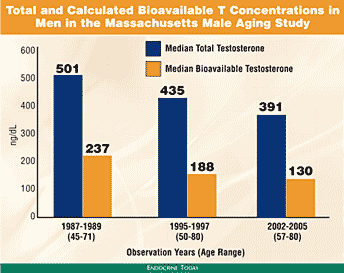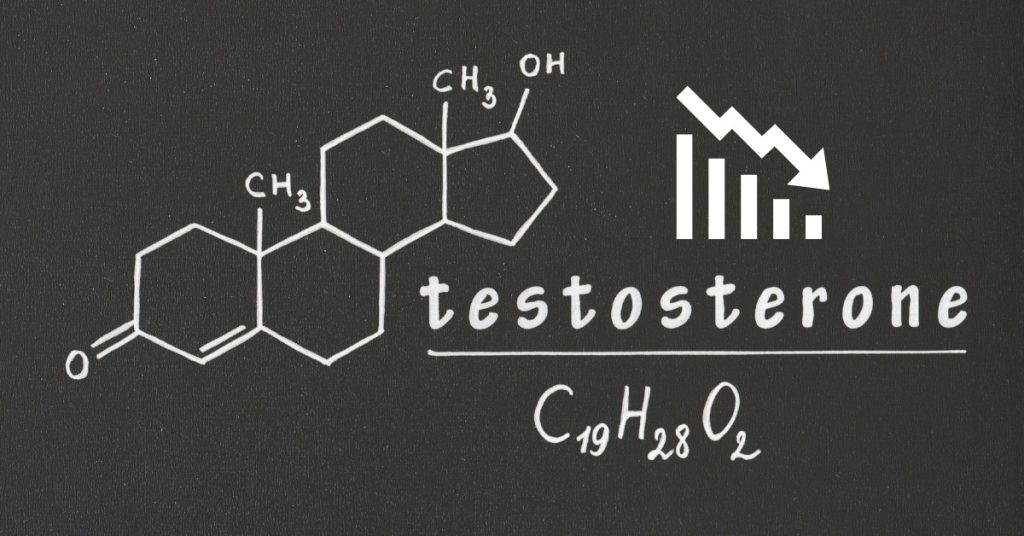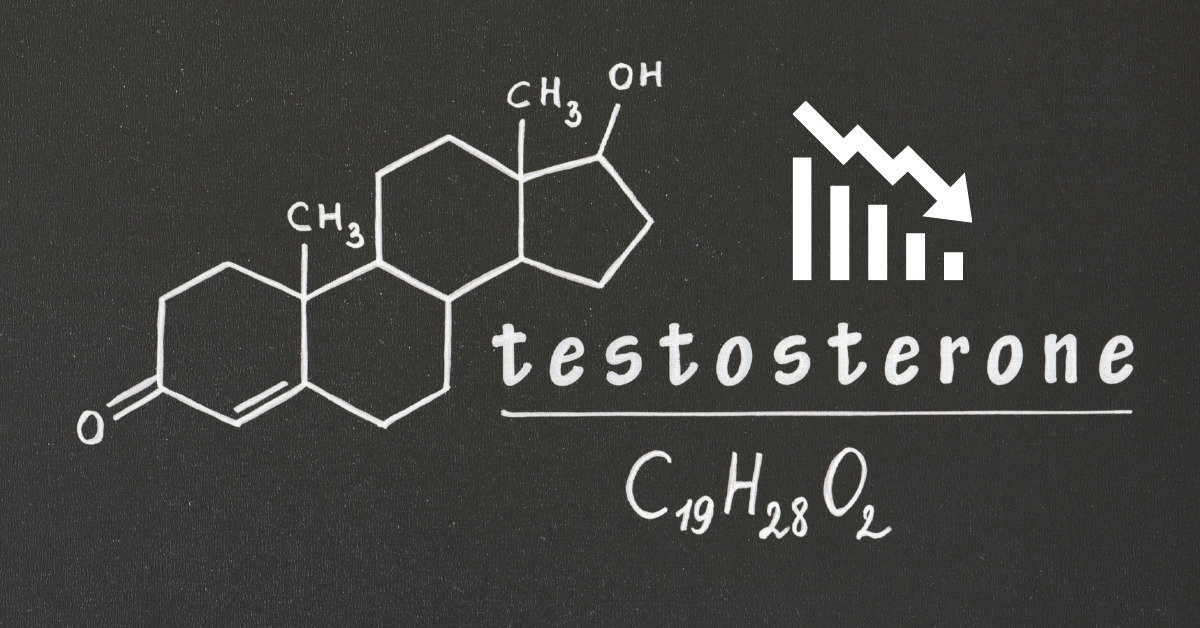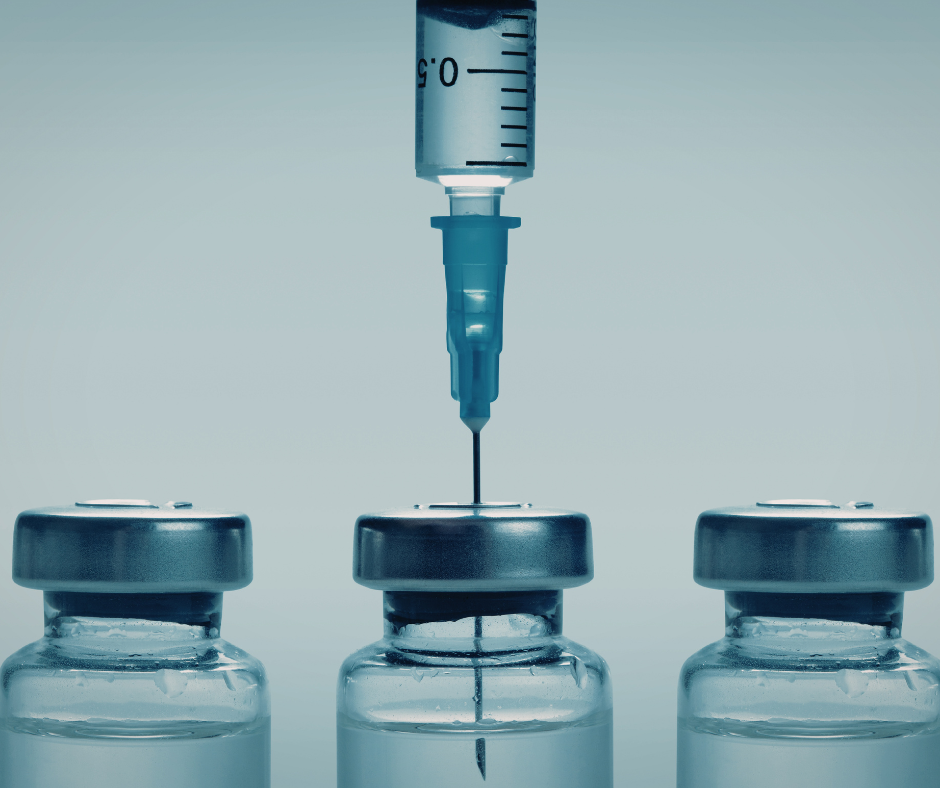Testosterone, the male sex hormone, has declined over the last decades. This hormone is hugely vital for the proper development of young men, being especially notable during their teenage years.
The decline of generational testosterone not only affects older men; many other issues link directly to its causes, such as high blood pressure, obesity, and heart disease. Another factor is the change in behavior and genes in men, which also regulate testosterone levels.
There is no need to worry, as the causes of declining testosterone levels are being treated and researched in many places. Let’s dive in to see what is happening.

Declining Testosterone Levels Aren’t Just a Problem For Older Men
The average man’s testosterone levels have been down for decades, which is not only a symptom of aging. A study from 2007 informs us that these levels have dropped by nearly a 1% yearly average in men from the USA.
This decline does not limit itself to North America, though; each area of the world has its averages. If we take a generally healthier population, we can also observe another study from Denmark, finding that men born around the 1960s or before had a double-digit decrease in testosterone levels. So, it’s not something that limits itself to only one area of the globe.
With all this decline in testosterone, you may be wondering how men’s health could be affected:
Low testosterone levels can be related to a few reasons, such as diabetes, obesity, and even the continuous use of opioids and some cancer treatments. It’s not easy to diagnose since its symptoms are similar to other health problems. Even with this difficulty, today, we have better guidelines intended to give medical staff the tools for screening their patients and measuring their low testosterone levels in a lab.
It’s vital to get your levels checked because you never know if you could have an underlying problem that could get worst over time. Hormone treatment is never something to handle lightly, so you should check-up with your local TRT specialist or search for a qualified hormone therapy telemedicine provider such as EVOLVE.
Low Testosterone Causes Obesity, Heart Disease, and High Blood Pressure
Low testosterone levels are also linked with getting bigger and not being of the good kind. Obesity and diabetes are a direct influence, and these issues will give you a higher risk for heart disease. Over 70 million adults in the US alone suffer from obesity.
Testosterone is needed for the well-being of your blood vessels; Having low levels of this hormone can also be directly related to poor insulin and glucose sensitivity or even dyslipidemia when your cholesterol levels are unbalanced.
Even with all these factors, low testosterone levels don’t directly mean you are in poor health, although men with diabetes and bad health, in general, will also experience the mentioned problems.
Men who suffer from poor glucose tolerance have lower testosterone levels than women. How lucky for the girls!
Low testosterone can also help men with diabetes. However, the link between insulin resistance and androgens is still under research, so check with your TRT specialist if you’re considering treatment.
Genes Play a Part in Testosterone Levels
The genetic pool has a significant influence on testosterone levels too. This study from Durham University explains that testosterone in men changes a lot between generations. Men who live in poorer areas where the disease is more common have a greater chance of having low testosterone levels than those who grow up in a more well-off environment. These discoveries show us that genetics plays a huge part, affecting all men across generations.
The sex-related differences in testosterone production also play a part in the declining pattern. In mice, testosterone treatment decreased the levels of LPS inflammatory responses. When treating the males with the LPS shock, they had a reduced mortality rate than the females. The immune system is affected differently when comparing the two biological sexes.
Behavioral Changes and Their Effect on Testosterone Levels
The social and biological context is essential for understanding the link between testosterone and behavioral traits. Testosterone has historically limited its study to males, but researchers are increasingly aware of the impact the social context has in shaping the testosterone levels of individuals.
Behavioral changes can be a significant influence on changing T levels in men. A study linked testosterone levels to long-term changes in the way men live and work both. For example, young men have a lower chance of holding jobs in manual labor positions and are more likely to have more significant relationships with their kids and partner. Additionally, younger men have a higher chance of living with other people and produce more social hormones, such as oxytocin, which is the natural opposite of testosterone. This seems logical as when we are younger, our T levels are much more pronounced (in men), while on the other hand, as you enter more mature stages in life, you want to develop your family and be a bit more in the calm of things.

Male Hormone Testing & TRT
If you suspect that you have low testosterone levels, your doctor will perform various tests to check your hormone levels to see if this is an issue that you should be concerned with. If you do have a hormonal imbalance, you and your doctor will create a plan to balance your hormones. Balancing your hormones helps your body function as it should, so don’t hesitate to get tested.
At Evolve Telemedicine, we specialize in hormone optimization and making sure that imbalances are properly treated. Because every person is different, it’s important to carefully review your test results to create the most effective treatment plan. This treatment plan is prescribed by a licensed physician who specializes in treating hormone-related symptoms. You will receive ongoing support from the Evolve patient care team, from scheduling a blood test to treatment and follow-ups.
Conclusion
Although there is a noticeable decline in testosterone and considering you don’t have any underlying health issues such as obesity or others, these lower levels needn’t always mean a bad thing. The importance of your environment and surroundings will affect your testosterone levels, and stick it to your gene pool. Genetically, your descendants will naturally have lower levels directly affected by your genes.
Staying healthy is always important, and your testosterone levels can affect or be affected by all the above problems.
If you’re considering treatment for your hormone levels, always check first with a specialist. Schedule your free consultation to get started with a personalized and effective testosterone treatment plan!
Sources & references
Reuters: Men’s testosterone levels declined in the last 20 years
Icenews: Testosterone levels decreasing in Danish men
National Library of Medicine: Testosterone and Aggressive Behaviour in Man






